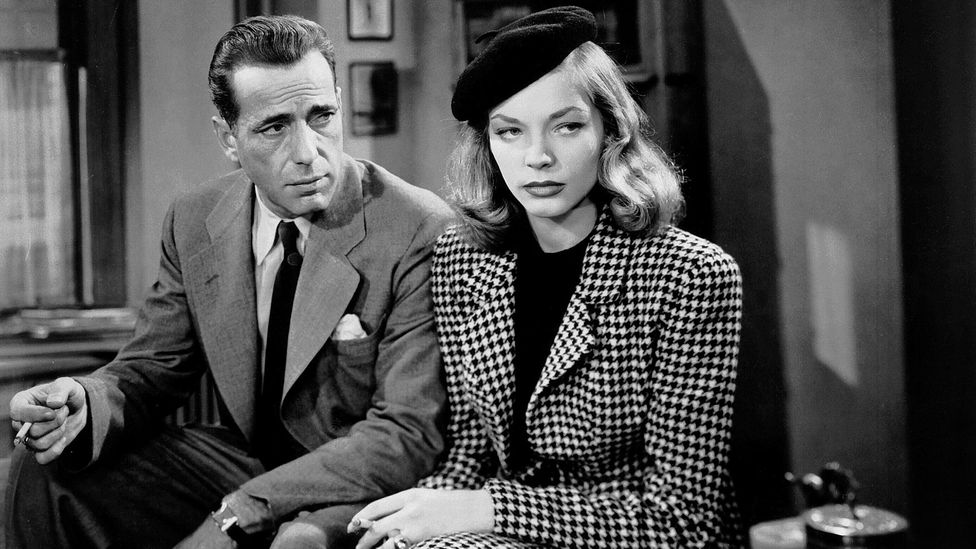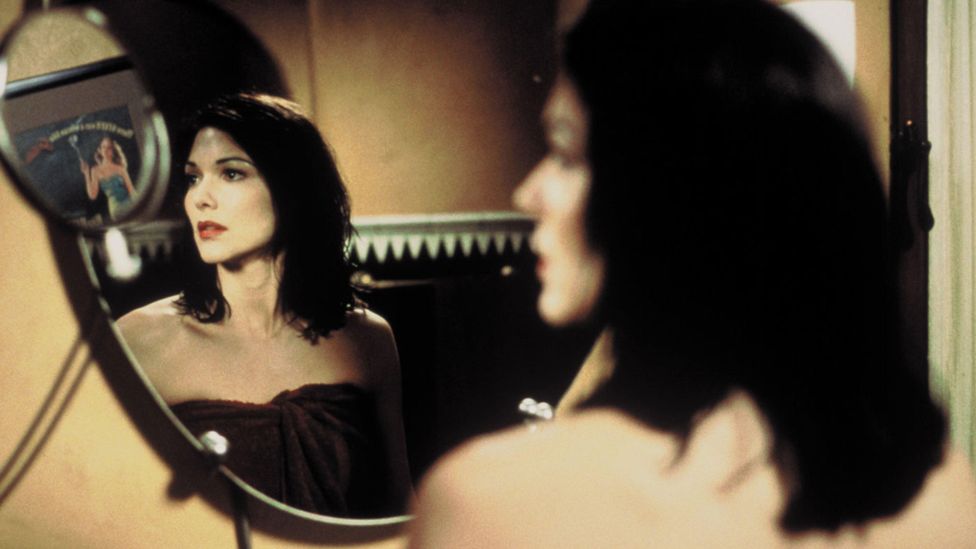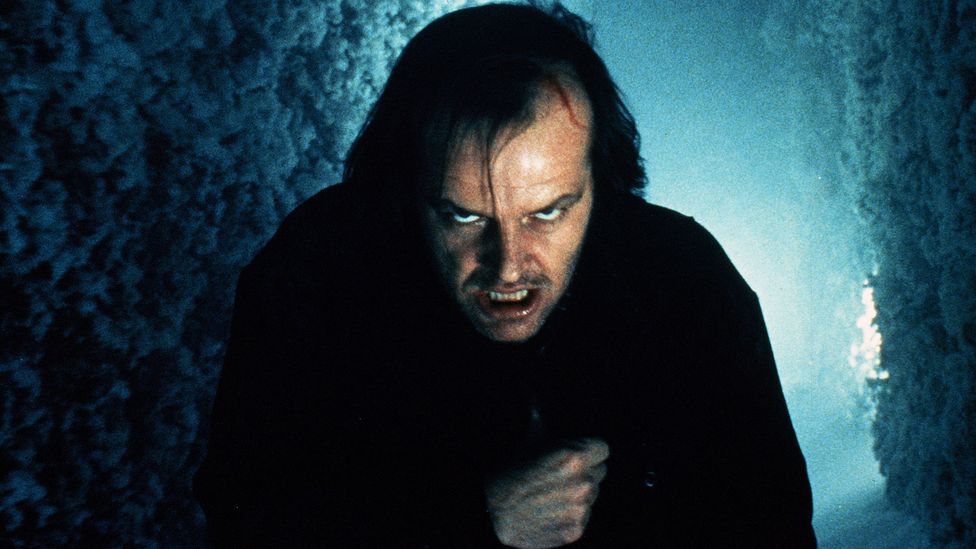The Big Sleep was released 75 years ago, and its plot has been puzzling viewers ever since. There is no disputing that Howard Hawks's Los Angeles-set noir classic is one of the most entertaining of all US films, thanks to its firecracker dialogue, brutal action, sultry atmosphere, and the volcanic sexual chemistry between its stars, Humphrey Bogart and Lauren Bacall. But there's also no disputing that it's hard to know what exactly is going on. When The Big Sleep came out in 1946, the New York Times's Bosley Crowther pronounced it "a web of utter bafflement... in which so many cryptic things occur amid so much involved and devious plotting that the mind becomes utterly confused". All these decades later, the film's judgemental Wikipedia entry tuts that it "is impossible to follow", and is celebrated by "movie-star aficionados" only because "they consider the Bogart-Bacall appearances more important than a well-told story". Take that, movie-star aficionados!
More like this:
- The X-rated 70s film that still shocks
- The dark history of kids' animations
- The 90s erotic thriller to end them all
In fact, the plot isn't impossible to follow – it's just extraordinarily difficult without a pen, a notepad and a pause button to hand. Not only do you have to remember all the gorgeous librarians, shopkeepers, waitresses and taxi drivers who throw themselves at the film's wisecracking private-eye hero, Philip Marlowe (Bogart), but you also have to distinguish between the many male murderers and murder victims, among them Harry Jones, Joe Brody, Eddie Mars, Carol Lundgren, Lash Canino, Owen Taylor and Sean Regan. But is that really something to complain about? Is it a problem if "the mind becomes utterly confused" by a film? Or can that sometimes be one of its main attractions?

The Big Sleep has been accused of being bewildering, but following the plot is (just) possible (Credit: Alamy)
Warren Buckland is the author of Narrative and Narration, and a specialist in films that take some figuring out. "The notable thing about The Big Sleep," he tells BBC Culture, "is that it adheres to restricted narration: it only shows what one person sees and hears – in this instance Marlowe. Because the main events happen near the film's beginning, Marlowe knows little about the story, which means that spectators know little, too. It can be frustrating, but it all works."
The other reasons why the film is a head-scratcher are interesting, too. Raymond Chandler wrote the first of his Marlowe novels by cobbling together two previously published short stories, which could be why it appears to have two separate, occasionally overlapping plots. Then the screenwriters (William Faulkner, Leigh Brackett, and Jules Furthman) struggled to adapt it. The most famous anecdote about the production is that no one could decide whether a particular character killed himself or was murdered – and if so by whom. When Hawks cabled Chandler to ask him, the author cabled back to say that he didn't know, either.
On top of this, there were various scandals that Marlowe uncovers that had to be fudged to get past the censors: gay relationships and pornography are alluded to in the vaguest possible terms. And chunks of the film were reshot to capitalise on the popularity of Bogart and Bacall, who had just had a hit with another Hawks thriller, To Have and Have Not. Jack Warner, the studio head, ordered new scenes with more innuendo-laced dialogue between the two stars. To make room for these, Hawks edited out scenes that clarified Marlowe's discoveries, as well as scenes in which Bacall was outshone by Martha Vickers, who played her character's sister. So... the plot of an already murky novel was muddied to mollify the Production Code office, and muddied further to glamorise its actors. All told, it's surprising that it's as coherent as it is.
Following the clues
But it would be wrong to say that The Big Sleep doesn't have a "well-told story". As knotty as the plot may be, the labyrinthine structure isn't a defect that is balanced out by Bogie-and-Bogart's smouldering interplay. On the contrary, the fact that your mind has to race to keep up with Marlowe's is a major part of the film's appeal. Instead of just watching the detective, you become a detective yourself. The Big Sleep keeps you wide awake. "It comes down to input and output," says Buckland. "The more effort you have to put in, the more pleasure you get from working it out. If a film has a simple narrative, then your pleasure is different. With a puzzle film, you have to process it and you're rewarded for that."
Just think of such beloved brain-testers as Shane Carruth's Primer, a zero-budget time-travel tale which practically forces you to draw diagrams and flow charts. Or Richard Kelly's debut, Donnie Darko, which built a cult following via midnight screenings and DVD viewings as its devotees luxuriated in its trans-dimensional riddles. Or even The Big Lebowski, the Coen brothers' gonzo homage to The Big Sleep. Straightforward adventure movies can be exciting, but films that don't give you all the answers are the ones that keep you pondering, talking, and poring over articles on the internet. Crucially, they're also the films that keep you rewatching them. "The thing about movies with great ambiguities, impossible mysteries, or sometimes even just a few elliptical gaps, is that they draw you back again and again hoping that this will be the time you'll solve them," Rodney Ascher, director of A Glitch in The Matrix, among other documentaries, tells BBC Culture. "Those which tie up each and every one of their loose ends are satisfying in the short term, but sometimes you're done thinking about them before the lights come up."

David Lynch's Mulholland Drive is emblematic of the director's enigmatic approach (Credit: Alamy)
Years after we first saw it, some of us are still trying to decipher the final shot of Michel Haneke's unsettling Hidden/Caché. And David Lynch has made a career out of bamboozling us with the likes of Eraserhead, Blue Velvet, Lost Highway, and Mulholland Drive, the latter winning BBC Culture's critics poll of the best films of the 21st Century. "I love mysteries," the director said in one interview. "I love not knowing about certain things because in the mystery I feel more than if it was explained to me. Once you start explaining something so 20 people understand it, there's no magic to it anymore."
Stanley Kubrick knew all about the magic within a mystery. If you aren't sure what to make of the psychedelic trip at the end of 2001: A Space Odyssey, that's because he didn't want you to. "Arthur C Clarke [the film's co-writer] wrote a whole voiceover explaining everything," says Buckland, "and he was a bit miffed when Kubrick took it out at the very last minute." As for Kubrick's blood-drenched Stephen King adaptation, The Shining, it's debatable whether the ghosts in the Overlook Hotel are being imagined by Jack (Jack Nicholson), conjured up by his psychic son Danny (Danny Lloyd), or generated by the hotel itself. But this enigma is part of what makes The Shining so fascinating: Ascher directed a whole documentary, Room 237, in which several fans theorise about what Kubrick was getting at. Was the film a comment on the Holocaust, or on the slaughter of Native American tribes, or on Kubrick's own role in faking footage of the Apollo moon landings?
All that we know for certain, says Ascher, is that Kubrick was deliberately keeping us guessing. "The last shot of The Shining is a black-and-white photo of Jack at a party that took place 60 years earlier. In some ways it feels like it's being presented as the solution to the mystery of the film, like Citizen Kane's Rosebud moment. But it's anything but. The truth of it is that it creates more questions, new ones we didn't even know to ask before that moment."

Stanley Kubrick deliberately kept mystery at the heart of his films, such as The Shining (Credit: Alamy)
One person who didn't enjoy those questions was Stephen King himself. The author was never happy with Kubrick's film, so he scripted his own TV mini-series of The Shining which was broadcast in 1997. Its plot is more comprehensible, but King aside, not many people would class that as an improvement. Writing in The Dissolve, Tasha Robinson condemns the "thudding, overexplained literalism" of a mini-series which "opens with a clumsy exposition scene that lays out King's symbolism and explains exactly how the story will end". The same sort of thing happened with The Big Sleep. Also in 1997, the original cut was finally released, complete with the scenes in which Marlowe talked the viewer through his sleuthing. Roger Ebert, the Pulitzer-winning Chicago Sun-Times critic, noted that the film's "charge" was missing: "This is a case where 'studio interference' was exactly the right thing." Some mysteries are better left unsolved.
On the other hand, we like to feel that someone can solve those mysteries, even if we can't. If a perplexing film seems to be nothing more than a self-indulgent mess, as some critics argued Christopher Nolan's Tenet was, it's easy to lose patience. But if there seems to be an intelligent, logical interpretation to it that's somewhere just beyond our reach, we're tantalised and intrigued. "Freud's concept of the uncanny is useful in explaining the difference between a meaningless film and a mysterious film," says Buckland. "The uncanny means unhomely and homely at the same time. When we watch a David Lynch film, it's strange, but we still recognise something there."
Above all, perhaps, what we recognise are the countless incidents in our own lives that we don't quite understand. When a film is neat and tidy, it can seem false. In Lynch's words, "that's not the way life is, so it makes the film seem completely uninteresting". But when a film has its conundrums and contradictions, it chimes with our own experiences. However fantastical it may be, it's truthful in a way that some more lucid films aren't. It's probably going too far to say that The Big Sleep is naturalistic, but when we stumble through its jungle of red herrings, passing glimpses, mistaken identities and lucky hunches, we sense that this is what criminal investigations are really like – and this is what life is like, too.
Love film and TV? Join BBC Culture Film and TV Club on Facebook, a community for cinephiles all over the world.
If you would like to comment on this story or anything else you have seen on BBC Culture, head over to our Facebook page or message us on Twitter.
And if you liked this story, sign up for the weekly bbc.com features newsletter, called The Essential List. A handpicked selection of stories from BBC Future, Culture, Worklife and Travel, delivered to your inbox every Friday.
"film" - Google News
August 12, 2021 at 02:00PM
https://ift.tt/2W1XeRM
The Big Sleep: The most baffling film ever made - BBC News
"film" - Google News
https://ift.tt/2qM7hdT
https://ift.tt/3fb7bBl
Bagikan Berita Ini














0 Response to "The Big Sleep: The most baffling film ever made - BBC News"
Post a Comment